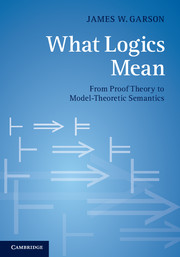Book contents
- Frontmatter
- Dedication
- Contents
- Preface
- Acknowledgements
- 1 Introduction to model-theoretic inferentialism
- 2 Deductive expression
- 3 Local expression
- 4 Global expression
- 5 Intuitionistic semantics
- 6 Conditionals
- 7 Disjunction
- 8 Negation
- 9 Supervaluations and natural semantics
- 10 Natural semantics for an open future
- 11 The expressive power of sequent calculi
- 12 Soundness and completeness for natural semantics
- 13 Connections with proof-theoretic semantics
- 14 Quantifiers
- 15 The natural semantics of vagueness (with Joshua D. K. Brown)
- 16 Modal logic
- Summary
- References
- Index
14 - Quantifiers
Published online by Cambridge University Press: 05 June 2014
- Frontmatter
- Dedication
- Contents
- Preface
- Acknowledgements
- 1 Introduction to model-theoretic inferentialism
- 2 Deductive expression
- 3 Local expression
- 4 Global expression
- 5 Intuitionistic semantics
- 6 Conditionals
- 7 Disjunction
- 8 Negation
- 9 Supervaluations and natural semantics
- 10 Natural semantics for an open future
- 11 The expressive power of sequent calculi
- 12 Soundness and completeness for natural semantics
- 13 Connections with proof-theoretic semantics
- 14 Quantifiers
- 15 The natural semantics of vagueness (with Joshua D. K. Brown)
- 16 Modal logic
- Summary
- References
- Index
Summary
The natural semantics for standard ND rules for the quantifiers may come as something of a surprise, for it differs from both the objectual and the substitution interpretations (Section 14.3). The semantics that is expressed by the rules for the universal quantifier ∀, dubbed the sentential interpretation, is distinctly intensional and requires a side condition ensuring that the variables all denote in the same virtual domain (Section 14.4). Because of this, the sentential interpretation is not functional, and so it will be important to establish an isomorphism result to establish that it qualifies as a semantics (Section 14.5). One might hope that sequent systems that force a classical treatment of negation might be strong enough to eliminate the difference between the sentential interpretation and familiar readings of the quantifier, but Section 14.6 reveals that the difference persists. Section 14.7 shows how that difference may be exploited to establish that natural semantics (even for sequent systems with multiple conclusions) fails to be referential, that is, there is no guarantee that models of those systems can be treated as if their variables referred to objects in a virtual domain. Section 14.8 turns to the natural semantics for ∃, the existential quantifier. The surprise here is that ∃ lacks existential import. Section 14.9 points out that adoption of the omega rule is sufficient to force the substitution interpretation of the quantifiers. In Section 14.10, results of the chapter are marshaled for a criticism of Hacking’s program to limn the logical.
- Type
- Chapter
- Information
- What Logics MeanFrom Proof Theory to Model-Theoretic Semantics, pp. 211 - 243Publisher: Cambridge University PressPrint publication year: 2013



